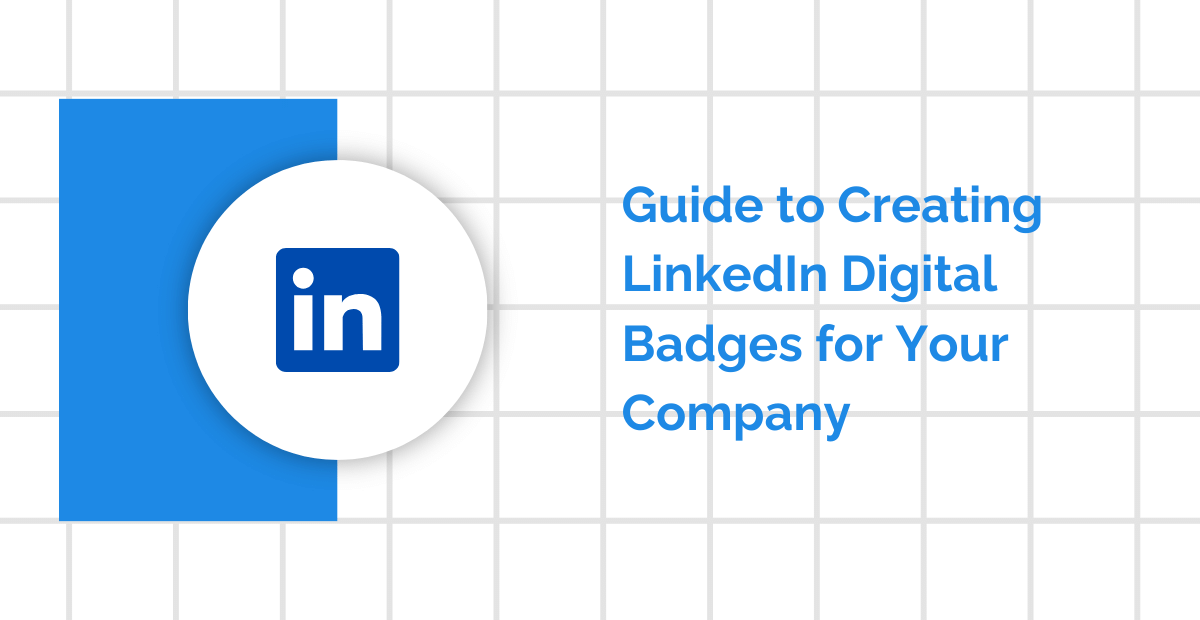You’ve probably seen those shiny little badges people post on LinkedIn after finishing a course—but ever wonder why they matter?
Well, those aren’t just digital trophies—they’re called digital credentials, and they’re quietly powering the growth of some of the biggest names in EdTech today. As more students shift to online learning, these credentials help learners prove what they’ve learned and help platforms show the value of their content.
From short badges earned in coding bootcamps to certificates issued by major universities, digital credentials are quickly becoming the new “receipt” for education in a digital-first world.
In this blog, we’ll unpack what digital credentials really are, how they’re being used by EdTech companies, and why they’re gaining so much traction—especially among students, educators, and hiring teams alike.
Let’s Start with the Basics: What Is EdTech Anyway?
You’ve probably heard of EdTech before—maybe in passing, maybe every day. But what does it really mean?
EdTech, short for Educational Technology, is any tech-based solution that supports or enhances learning. It can be as simple as using a quiz app on your phone, or as complex as an AI-powered tutoring platform.
From tools like Khan Academy and Google Classroom to learning giants like Coursera or edX, EdTech is where classrooms meet code. And it’s growing. According to HolonIQ, global EdTech spending is expected to exceed $400 billion by 2025. That’s not just impressive—it’s transformative.
So, What Are Digital Credentials—and Why Do They Matter?
Imagine finishing an online course on data analysis. You learned a ton—but how do you prove it? A digital credential solves that.
A digital credential is an online, verifiable proof of learning or skill. It might be a badge, certificate, or micro-credential, but here’s the key: it’s secure, portable, and easy to share—especially on platforms like LinkedIn or job portals.
Let’s break it down a bit more:
-
Digital badges: These are graphic icons with embedded data that explain what you’ve learned.
-
Digital certificates: These look like traditional paper certificates—but they live online, and are easier to verify.
-
Micro-credentials: These represent small, focused learning units—perfect for specific job skills.

“Think of them like digital trophies—only they actually prove something to the outside world.”
Platforms like CertifyMe are already helping EdTech providers issue these credentials to learners around the globe.
How Do Digital Credentials Fit into the EdTech Ecosystem?
Think of the EdTech ecosystem like a digital classroom—but way bigger. It includes online course providers, learning platforms, universities, bootcamps, and even corporate training programs. In this mix, digital credentials act as the bridge between what a learner does and how that learning is recognized—both within the platform and beyond it.
Let’s break it down a bit more. Most EdTech platforms focus on delivering flexible, on-demand learning—video lessons, quizzes, peer interaction, and maybe even project-based assessments. But here’s the catch: without a reliable way to prove those skills, a lot of learners are left with little more than screenshots and progress bars.
That’s where digital credentials come in—they validate the learning with verifiable, portable proof that actually means something outside the platform.
These credentials usually come in the form of digital badges or certificates. They’re issued automatically when a learner completes a course or demonstrates a skill, and they include important metadata like the issuing organization, date, learning outcomes, and skill levels.
This metadata is key—it’s what makes the credential verifiable, giving it weight when shared on LinkedIn, added to a resume, or submitted to an employer.
From a platform perspective, issuing digital credentials isn’t just about ticking a box. It’s a value-add. It boosts learner motivation (who doesn’t love recognition?), improves course completion rates, and builds trust with institutions and employers. Plus, it helps the platform showcase measurable outcomes—something every educator and administrator wants to see.
And from the learner’s point of view? It’s empowering. Instead of relying solely on transcripts or hard-to-read PDFs, students walk away with credentials they can actually use—whether they’re applying for jobs, graduate school, or freelance gigs. It’s a way of saying, “I didn’t just watch the videos—I learned, I practiced, and here’s the proof.”
In short, digital credentials are no longer optional in the EdTech space—they’re becoming the connective tissue that links learning, skills, and opportunity.
And as more institutions and employers start trusting and accepting them, their role in the EdTech ecosystem will only grow stronger.
How Digital Credentials Are Fueling EdTech Growth
Let’s zoom in on the real impact. Here’s how digital credentials are helping EdTech companies grow faster—and smarter.
-
They Add Instant Credibility
People are still a little skeptical of online learning. “Is this real?” “Will it count for something?” Digital credentials answer those questions.
When learners know they’ll receive a verifiable credential—not just a “thank you for attending” email—they’re more likely to enroll.
And employers? They’re more likely to respect and accept courses that come with secure, recognizable proof.
“It’s one thing to say you learned something online. It’s another to show a certified digital credential with your name on it.” -
They Help EdTech Platforms Stand Out
There are hundreds of learning platforms out there. The ones that offer digital credentials give learners something more tangible—something they can actually use.
This helps EdTech companies:
-
Attract more learners
-
Improve course completion rates
-
Build loyalty and trust
Even major institutions are jumping on board. For example, MIT and Harvard have integrated digital certificates into many of their online learning programs.
This helps EdTech companies strengthen their marketing strategy, attract more learners, improve course completion rates, and build loyalty and trust.
-
-
They Support Career Growth—Which Attracts More Users
Let’s be honest: most learners aren’t just in it for knowledge. They want better jobs, higher pay, or a new career path.
Digital credentials help learners show their progress in ways that are meaningful to hiring managers and commercial partners.
-
A student can complete a customer service course on LinkedIn Learning and instantly display the badge on their profile.
-
Someone learning UX design on Coursera can share their certification with future clients or employers.
These stories build trust and word-of-mouth growth for EdTech companies.
-
-
They Make Learning More Modular and Flexible
Instead of spending months on a massive course, learners can earn micro-credentials for smaller chunks of learning.
“It’s like collecting puzzle pieces that eventually form the bigger picture of your skills.”This stackable approach gives EdTech platforms the flexibility to design content for everyone—from beginners to experts—while keeping learners engaged at every step.
According to the World Economic Forum, micro-credentials will play a critical role in the future of reskilling and lifelong learning.

Why University Students Should Care About This
Let’s be honest—most students don’t get excited about credentials. Until, of course, they start applying for internships, jobs, or grad school and realize a plain transcript doesn’t tell the full story. That’s when digital credentials start to matter. A lot.
Unlike traditional grades or bulky transcripts, digital credentials give students a way to show off their actual skills and achievements in a format that’s easy to share and instantly verifiable. Think of them like micro-highlights of your learning journey—each one tied to a specific course, project, or skill you’ve mastered. They’re not just badges for the sake of it. They’re like receipts that say, “Yes, I know this. Here’s how and when I learned it.”
Whether you’re learning a new language, building a website, completing a case study, or taking a course on data analytics—those hours deserve more than a “Participation” label. Digital credentials let you tell a more complete, more honest story about your effort, growth, and curiosity. And when you’re competing in a crowded job market, that little extra context can make all the difference.
More importantly, digital credentials are built for the digital spaces where you already live—your LinkedIn profile, your online portfolio, your resume. They’re clickable, shareable, and often backed by blockchain or other secure tech, which means they can’t be faked or edited. That gives employers more confidence, and gives you a better shot at getting noticed for what you actually know, not just what your major says.
So if you’re a student looking to stand out—or just to keep track of everything you’ve learned beyond the classroom—digital credentials are worth paying attention to. They’re not replacing degrees, but they are filling in the gaps between coursework and real-world skills. And in today’s world, that’s where the real edge lies.

Many students are now combining their university degrees with short online credentials—something recruiters are starting to expect, not just appreciate.
Why University Admins and Registrars Should Pay Attention
If you’re in the Registrar’s Office or part of the academic administration, digital credentials offer new ways to modernize student records and recognize non-traditional learning.
Here’s what’s in it for institutions:
Universities aren’t just places of learning—they’re hubs of credentialing. And in a digital-first world, sticking to paper certificates and clunky PDFs just doesn’t cut it anymore. Digital credentials offer institutions a smarter, more flexible way to track, verify, and celebrate student achievements.
Let’s start with transparency. When universities issue digital credentials, they can embed detailed information—like course outcomes, skills acquired, time spent learning, and even assessment criteria. This isn’t just helpful for students; it’s reassuring for employers, graduate programs, and partner institutions. It’s like giving a clear window into what a student actually did, rather than just what course they passed.
Then there’s efficiency. With digital credentialing platforms, registrars and admin staff can automate the entire credentialing process—no more printing, signing, or mailing physical copies. It saves time, reduces errors, and helps institutions manage records at scale. Need to reissue a certificate? Done in minutes. Need to verify a credential from three years ago? Just a click away.
But here’s the real kicker: digital credentials boost the institution’s brand.
Every time a student shares a verified badge on LinkedIn or embeds a certificate on their resume, your university gets visibility. It’s a built-in form of recognition—each credential carries your logo, your standards, and your reputation forward. And as more platforms and employers start accepting these formats, universities that adopt digital credentialing early show they’re ahead of the curve.
Plus, it opens doors for non-traditional learning pathways—like micro-credentials, short-term programs, and co-curricular activities. You’re not just certifying degrees anymore; you’re capturing the entire learning journey. That’s a win for students, and a big leap forward for how institutions show impact.
In short, digital credentials aren’t just a tool—they’re a strategic asset. One that makes operations smoother, student outcomes clearer, and institutional value more visible in the digital world.
-
Integrate external learning into official records.
-
Partner with EdTech providers to offer co-branded credentials.
-
Reduce fraud with verifiable certificates.
-
Build a student-first, future-proof ecosystem.
Quick Reality Check: Who’s Already Doing This?
Let’s take a look at a few EdTech giants embracing digital credentials:
-
Coursera: Offers credentials from institutions like Yale, Google, and IBM.
-
edX: Issues professional certificates and even full degrees with digital verification.
-
Udemy: Provides completion certificates for most of its paid courses.
-
LinkedIn Learning: Allows learners to share certificates directly to their profiles.
-
Google Career Certificates: Backed by industry-recognized badges that align with job openings.
These companies aren’t just handing out awards—they’re building ecosystems of verified learning.
Looking Ahead: What’s Next for EdTech and Digital Credentials?
The connection between EdTech and digital credentials is only getting stronger.
Here’s what we’re likely to see:
-
Deeper integration of credentials into hiring platforms like LinkedIn and Indeed.
-
Blockchain-based records that students truly own.
-
Cross-platform credentialing, where learners collect badges from multiple EdTech providers into one verified profile.
-
Stronger university-EdTech partnerships for co-issued credentials.
It’s More Than Just a Badge
At first glance, digital credentials might just look like a fancier way to say “you completed a course.” But in reality, they’re helping EdTech companies build trust, attract learners, and make education more meaningful.
For students, they offer visibility. For universities, they offer innovation. For EdTech platforms, they offer growth.
So next time you take an online course, don’t just finish it. Look for the badge. It might open doors you didn’t even know were there.
Conclusion
So, what’s the big picture here?
Digital credentials aren’t just fancy add-ons—they’re shaping how EdTech companies build trust, track learner progress, and show value to students and institutions alike. For learners, it’s about more than just collecting badges—it’s about building a verified story of growth and effort. And for EdTech companies, it’s a smart way to stay relevant in an industry that moves fast and changes often.
If you’re part of a university or work with a platform that’s looking to bridge the gap between learning and employability, digital credentials are worth a closer look. They offer clarity where traditional transcripts sometimes fall short, and they create a learning journey that actually feels seen.
Plus, they support transparency—students know what they’re earning, and employers know what they’re hiring. That kind of alignment? It matters more than ever.
And if you’re curious about how to start, CertifyMe makes it simple to issue, manage, and share digital credentials that actually make a difference. Whether you’re with a college registrar’s office or building a course catalog from scratch, CertifyMe helps you offer verified credentials that are secure, shareable, and easy to trust.
You don’t need a big tech team or complex tools—just a partner who gets what educators and learners really need.
Feel free to book a quick demo if you’d like to see it in action.

 Author :
Author : .png)




